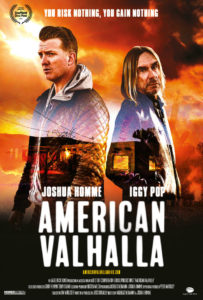American Valhalla | Directors: Josh Homme & Andreas Neumann | Rating: 9/11

Release Date: July 11, 2017
It’s hard work being a living legend: expectations – those of others and those self-imposed – can be burdensome on the soul, but that pedestal is somewhat easier to rest upon when you A) are harshly and humorously self-aware, B) are given the emotional space to mine some of your best work with Queens of the Stone Age’s Josh Homme and, C) are Iggy Pop.
The 2016 Grammy nominated rock collaboration between Pop, Homme, QOTSA bandmate Dean Fertita and Arctic Monkeys drummer Matt Helders, Post Pop Depression (Iggy Pop’s conscious decision to creatively step outside of his comfort zone), served as the catalyst for American Valhalla and it’s all quite the work of heart. At its worst, rock and roll idolization can be dangerous but directors Homme and Andreas Neumann shape the act into an almost painfully beautiful thing to witness and one that – at various points in the telling – simultaneously constricts your cardiac muscle and pushes it to pump faster.
It is easy to understand Homme declaring Post Pop Depression to be “the coolest thing I’ve ever been allowed to be part of” particularly as the heft of the project was reliant upon Pop feeling comfortable: not solely while camped out at Homme’s Joshua Tree, CA desert digs, Rancho De La Luna, to record the album but within his own head while being encouraged to dig artistically, lyrically and personally deeper. Dusty scenery, motorcycles, night skies, campfires. Sacred space ensues. Captures of Pop at his Miami, FL home and at the ranch are as amusing and revealing as they are forthright: the decision to record two French albums, taking work to pay the bills, friction between himself and his band the Stooges, that he’s not “a great guy.” For some inexplicable reason Anthony Bourdain somewhat facilitates these conversations: it’s fine as it neither adds to nor takes away from the flow or the image of Pop letting you into his headspace while resting in a hammock.
By contrast, Homme fills a more existential role by being a slightly more detached voice who does more reading of his thoughts (from his own personal journals kept during the recording and tour) than feeding into a Q&A session; he’s all freeform poetic with heavy-handed yet astute insight into art, precious moments and “touching the bumper.” Even when Homme self-critically tosses off lines about being unable to read his own handwriting or pulls out the FedEx package of notes sent to him by Pop about his Berlin years with musical co-passenger David Bowie and chair-centric verses to jump start the record, his reverence for the man who has embodied a zero-fucks-given defiance is tangible. As is the recall of the full-bodied and somber invasion of mortality and loss upon Pop when he learned of Bowie’s death…the very morning he had to fly out to begin Post Pop Depression Tour rehearsals.
American Valhalla proves to be more than a simple rock documentary telling a linear story of static music moments: it is an undercover underdog tale, it is a reminder to not try to “out-rock” your elders and it is as powerfully warm-hearted and thoughtful as Pop is a certifiable icon. It also drives home the somber fact that ours is a time when we are successively losing, not just musical treasures, but cultural ones who challenged and moved the yardstick on their generation’s averages and norms. As it stands, the 21 shows of 2016’s Post Pop Depression Tour – the music’s translation from studio to live, Pop’s physical frenetic rock posturing, the precious inclusion of songs from Pop’s solo albums, the band in all of their uniform finery honored to be this one man’s “backing band” – were a once in a lifetime event and it is the collective reflection by the players of the tour’s emotional crown jewel, the next to last show at London’s Royal Albert Hall, that speaks loudest and makes you feel all of your feelings. And if Valhalla existed on earth, that night may have been the musical version of it for Pop, Homme, Fertita and Helders..
